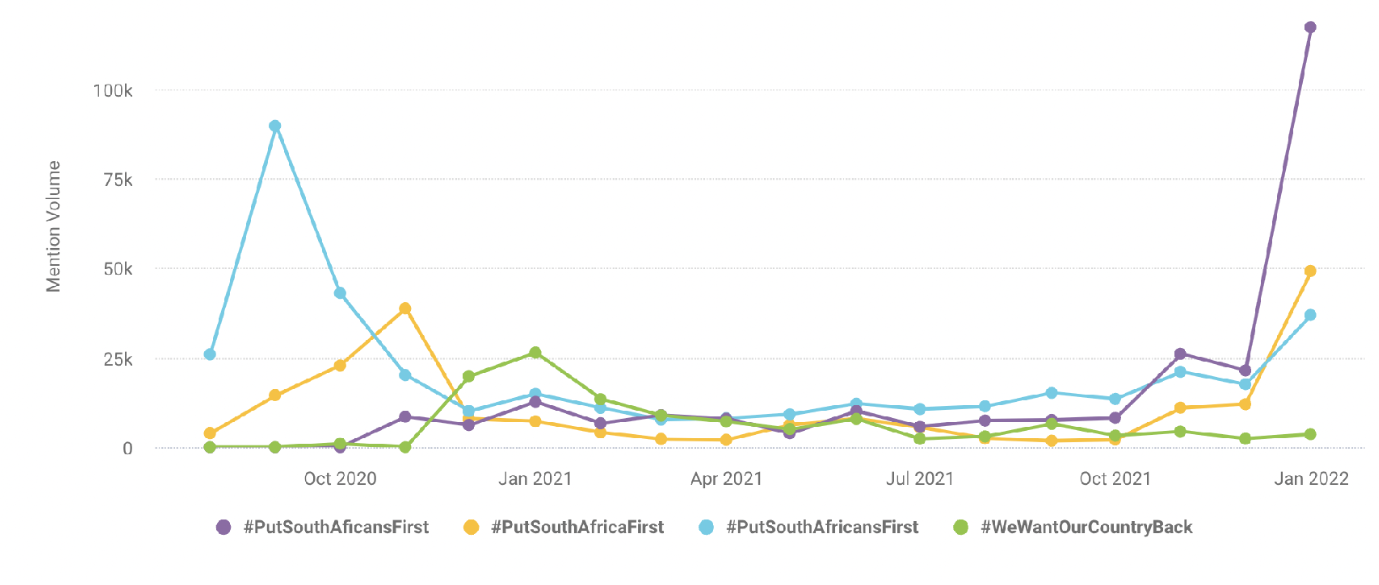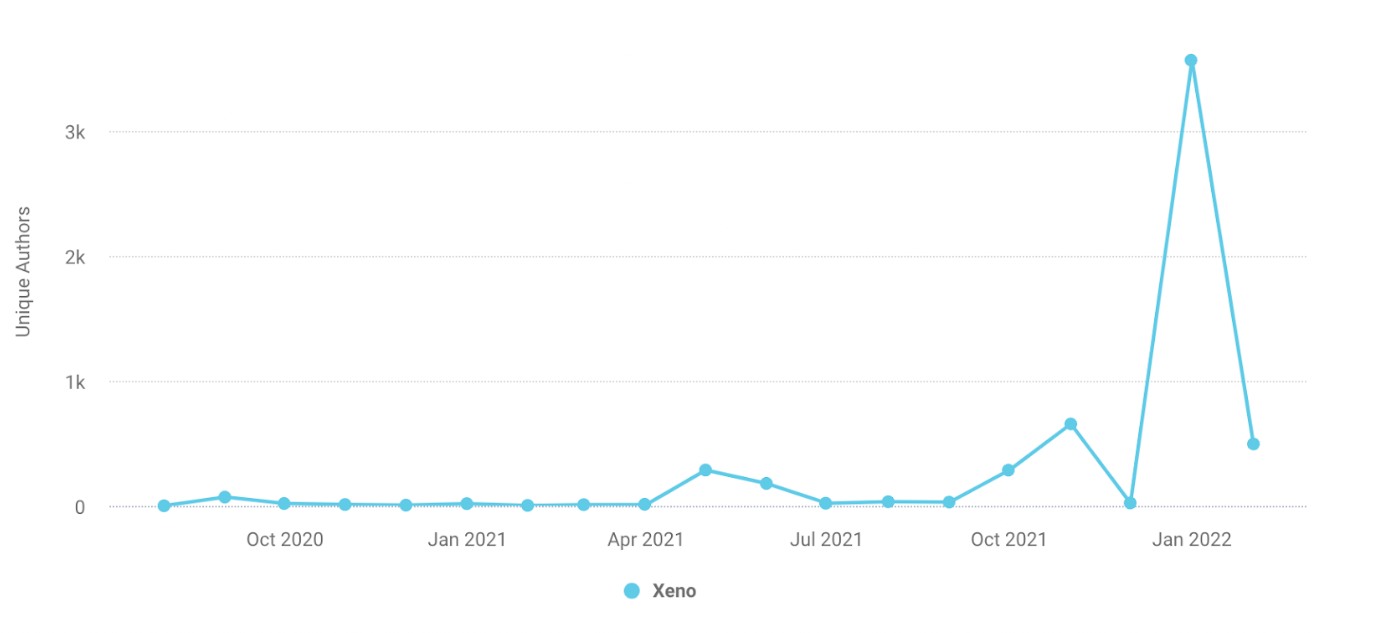OPERATION HATRED
Putting xenophobia first: Analysing the hashtags behind the Twitter campaigns

Over several years, one hashtag has become prominent on social media for rallying behind a campaign calling on government and the private sector to prioritise local jobs for South Africans over foreign nationals, while blaming immigrants for crime, among other social issues.
#PutSouthAfricaFirst was once spearheaded by @uLerato_Pillay, who was unmasked by the DFRLab in July 2020 as Sfiso Gwala, a dismissed member of the South African National Defence Force.
The messages shared by “#PutSouthAfricaFirst”, which has morphed into #PutSouthAfricansFirst and inspired others such as #WeWantOurCountryBack and #ForeignersMustGo have indicated attempts to sow antagonism between South African citizens and foreign nationals – and to divide South Africans into opposing camps.
Analysis of these hashtags over an 18-month period reveals how they were used to seed weeds of social discord among the blooms of democracy, especially in the midst of the election process.

Evolution of the top four hashtags within the ‘#PutSouthAfricaFirst’ conversation between 21 August 2020 and 31 January 2022.
In August 2020, the Centre for Analytics and Behavioural Change found that the @uLerato_Pillay account had deployed online disinformation tactics and had infiltrated socially divisive content into more than 50,000 Twitter accounts.
The CABC’s analysis of the #PutSouthAfricaFirst conversation between August 2020 and February 2022 indicates that elements of disinformation associated with the hashtag continue.
For example, a recent post that purports to show the degradation of a building in Hillbrow, Johannesburg, uses deceptive images of a building in Venezuela:
Hillbrow before and after illegal immigrants #PutSouthAfricaFirst pic.twitter.com/XEMwytRJbW
— Danilo 🇿🇦 (@sushifired) January 24, 2022
Another recent example of misinformation posing as regulation uses a hashtag with similar connotations to turn sentiment against foreign nationals:
#ForeignersMustleaveSA all former model c schools in the CBD’s are now reserved for foreigners. Our kids are forced to attend township schools. Is this what we voted for?
— Lucango (@lucangoMbil) March 25, 2021
In the past two years the #PutSouthAfricaFirst social media conversation, related hashtags and keywords have received more than 2.5 million mentions from more than 250,000 authors.

The conversation peaked between September and November 2020 and from November 2021 to February 2022, with a long lull in volume between these peaks:

The volume of the entire ‘#PutSouthAfricafirst’ conversation between 18 August 2020 and 13 February 2022 (weekly).
In the first 2020 peak, some advocates within the #PutSouthAfricaFirst conversation accused the media of turning a blind eye to crime and immigration, and unfairly labelling the movement as xenophobic.
No amount of intimidation can silence us. Newspapers may conduct their lousy researches about #PutSouthAfricansFirst oksalayo we want our country back. Unemployed South Africans must dominate the labour market not foreigners! #SAMediaMustFall
— Lucango (@lucangoMbil) August 24, 2020
The second peak in 2020 centred on allegations of increased human trafficking – prompting police to warn the public against sharing fake news about human trafficking.
After nearly 11 months of decreased mentions within the #PutSouthAfricaFirst narrative, conversation began to peak towards the first week of November 2021, coinciding with the local government elections.
Some Twitter users also expressed support for ActionSA for its stance against illegal foreign nationals during this period.
It’s crazy to call Herman Mashaba xenophobic, so South Africans aren’t allowed to express how they feel about illegal immigrants, whereas no where in the world you’ll find South Africans taking over cities and towns like it’s done here.
— Tomi Rikhotso (@TomiRikhotso) November 2, 2021
By mid-November 2021, another peak emerged with the circulation of online posters encouraging South Africans to join a #NoToZimWorkpermits march to the Union Buildings on 24 November.
No Surrender, No Retreat
Count Down to Pretoria 24.11.2021 #PutSouthAficansFirst #NoToZimWorkPermits pic.twitter.com/BnGFOwRjdg— Kwena Molekwa🇿🇦 (@Ruraltarain) November 18, 2021
Patriotic Alliance leader Gayton McKenzie’s tweet on the need to deport foreign nationals was a driver of the peak in the first week of January:
I will help arrange a meeting with all leaders who r serious abt the deportation of illegal foreigners, we shall meet early February, it should not be abt political parties or affiliation, it shld be abt taking back our country. We need mass action this year #PutSouthAficansFirst
— Gayton McKenzie (@GaytonMcK) January 6, 2022
The highest peak was on 18 January, when the Patriotic Alliance visited shops owned by foreign nationals and the EFF announced it would monitor the ratios of South Africans to foreign nationals in businesses.
Our law enforcement and health inspectors are not doing their job, we will do our part as @OnsBaizaNie. #PutSouthAficansFirst pic.twitter.com/d5wnMSsgOX
— Gayton McKenzie (@GaytonMcK) January 15, 2022
While new versions of the initial hashtag have evolved and others have emerged, the core message of the #PutSouthAfricaFirst conversation has continued to:
- Call for jobs to be prioritised for South African citizens
- Blame crime on foreign nationals
- Criticise government for lack of law enforcement
Here are some examples:
Jobs
Unemployment in South Africa is not the case of absence of jobs but the exclusion of South Africans from the labour market in favour of illegal foreigners. Illegal Foreigners are basically taking food out of our mouths. They are keeping us unemployed #ForeignersMustleaveSA
— MAPS ZA🇿🇦 (@Maps_pj) March 25, 2021
South African youth especially black ones need to take a break from groove and focus on building this country in favor of them coz in 20 years time, they’ll be begging for employment from people who came to this country as asylum seekers. #PutSouthAfricansfirst
— South African blood (Zulu soul) (@VictorGreatree) January 13, 2022
The PA is very clear that we want 100% jobs to be given to South Africans first, except where that skill cannot be supplied by South Africans. It’s not complicated to grasp.#PutSouthAficansFirst @OnsBaizaNie
— Gayton McKenzie (@GaytonMcK) January 19, 2022
Crime
Foreigners are our biggest problem in SA🇿🇦
1.Nigerians🇳🇬=Drugs, Fraud, Scams
2.Zimbabweans🇿🇼=Rapes,Murders, Robberies.
3.Mozambicans🇲🇿=Hijackings.
4. Chinese🇨🇳=Human trafficking.
5. Lesothoians🇱🇸=Illegal Mining.We need mass deportations immediately! #PutSouthAfricaFirst
— Patriot✊🏾🇿🇦 (@Thelandthief) January 8, 2022
Both black & white illegal foreigners are criminals! #nonegotiations
If speaking & acting out against such crime/criminals that are hijacking our state buildings etc is Xenophobic then I’m happy to be called such!
We will #PutSouthAficansFirst with or without YOU!#dudududu🎶✊🏾— nhlanhlalux (@nhlanhla_lux_) January 30, 2022
The law
Why are South Africans being bullied for asking Immigration Laws to be implemented & enforced? How is advocating for legal immigration xenophobic ? SA’s Laws are Subverted daily, our borders are in shambles & the legal routes in a nightmare!
— Kwena Molekwa🇿🇦 (@Ruraltarain) November 6, 2021
Just spoke to a Somalian immigrant here in SA. He says there is no law here. He says he has never seen a country where people simply walk in and start businesses, without papers or anything.
— ERROL💥💥💥💥💥💥💥 (@errolbsk) December 4, 2021
Having started with crime and unemployment to justify calls to #PutSouthAfricaFirst, supporters of this campaign have started to draw other factors in to drive their narrative.
Among these are that “South Africa has its own problems” and that calls to #PutSouthAfricaFirst are not different from what fellow African countries are doing for their citizens.
I’ve come to accept that calling South Africans Xenophobic is a gaslighting technique to take control of their country.
A young democracy, with a lot solve is being forced to take care of migrants from countries the world is afraid to rebuke their leaders for bad governance.
— 🇿🇦AttorneyAtLaw (@ZacMoselane) January 29, 2021
South Africa belongs to South Africans. We can’t allow people who destroyed their own countries to come here and further divide us. #PutSouthAfricansFirst pic.twitter.com/xiArM84IlR
— SA Politics🇿🇦 (@Politics2014Sa) August 21, 2020
In Zimbabwe I am a foreign national,along site Lesotho, Botswana, Mozambique etc, now the problem comes wen they are in south africa,wanting to be called Africans🙄.. Africans are playing with us, they are bullies but we won’t let them, the time will cme. #PutSouthAficansFirst
— 🇿🇦South Africa is for south africans (@Sanc_SA) January 23, 2021
Zimbabwean President Emmerson Mnangagwa’s post about prioritising Zimbabwean citizens for jobs elicited outrage from supporters of #PutSouthAfricaFirst, who used the post to call on the South African government to do the same.
Zimbabwe is open to the world for business, but Zimbabwean citizens should be the first to benefit from our economic growth.
I’m delighted to see that Zimbabwean farmers are partnering with @Nespresso to revive our nation’s coffee industry.
This is only the beginning!🇿🇼 pic.twitter.com/jfxAXi1Vm3
— President of Zimbabwe (@edmnangagwa) August 3, 2021
Many people from other African countries actually hate South Africans
You wont see that because you have been made to believe that South Africans are xenophobic.
You want to see Xenophobia? Visit other African countries, they will show you Xenophobia 😒
— Goitse🇿🇦 (@mookegoitse) November 15, 2021
We’re foreigners in Ghana, Nigeria, Zimbabwe and only in South Africa where we’re all Africans
Njani? #ForeignersMustleaveSA pic.twitter.com/n8kkbCyMWw— ANELE ™ (@Anele__ZA) February 26, 2021
Xenophobia se gaat!
They put themselves FIRST in their own countries and then cry xenophobia when we want to put south Africans First in South Africa.
Bayanya! pic.twitter.com/M09TJdbFkp
— Patriot 🇿🇦 (WE DEMAND IMMIGRATION CONTROL NOW) (@landback_) November 14, 2021
Throughout the past two years, supporters using the hashtag have denied accusations that it is xenophobic in any way, claiming that it is being patriotic. References that the rich were detached from calls to “#PutSouthAfricaFirst” have also made their way into the narrative.
Privileged SAns behind tall walls, electric fences, 24/7 CCTV surveillance and armed guards looking down on us for demanding immigration control, deportation of illegal foreigners, secure boarders and for South Africans to be put first. #PutSouthAfricansFirst
— Duke 🇿🇦 (@Lanches59287740) January 30, 2022
People who live in houses with high walls find it easy to call adherence to the rule of law, xenophobia.
Every ActionSA voter and supporter welcomes the people of the world, but they must come here legally, and when here, respect our laws. https://t.co/xZOkjMuSXB
— Herman Mashaba (@HermanMashaba) November 3, 2021
The three key focus areas of the conversation have also served to introduce many related – and unrelated – issues into the narrative.
For example, while some are calling for undocumented and illegal foreign nationals to leave the country, others are calling for ALL foreign nationals to leave, regardless of whether or not they are considered legal.
People who live in houses with high walls find it easy to call adherence to the rule of law, xenophobia.
Every ActionSA voter and supporter welcomes the people of the world, but they must come here legally, and when here, respect our laws. https://t.co/xZOkjMuSXB
— Herman Mashaba (@HermanMashaba) November 3, 2021
I know only 1 political party that used the ‘Sonqoba simunye’ slogan. Engathi sine background ecishe ifane nje bafo.
— KαVυɱҽȥιƚԋα Fυȥҽ 🗨 (@zam_okuhle65) September 23, 2020
All foreigners must go back where they came from…legal or illegal they must all fokof! They enjoyed their independence alone back in the 50s and 60s, our democracy is still very young we need time to get on our feet first…we will call them! Xenophobia se muur!
— Gobetse 🇿🇦 (@Gobetse_M) January 18, 2022
I don’t engage in debates that talk about foreigners cause as a SHANGAAN I’m called a foreigner by South Africans.
— Lady_M 🧚🏽♀️🌈 (@PaulinaM1306) November 16, 2021
I hope by foreigners you mean whites, because Africans are not foreigners in Africa #ForeignersMustleaveSA pic.twitter.com/y4urkhEVae
— KABZAGRAPHICS📷⚪ (@i_amkabzar) February 26, 2021
Reasons why Ishangane will never sound okay with me is that you don’t only refer this to Tsonga people, you call foreigners Ishangane and in a derogatory manner, like kwere kwere, we won’t be called visitors in our own country!
— Tomi Rikhotso (@TomiRikhotso) July 10, 2021
Whenever I see a #PutSouthAficansFirst tweet I retwet. I am a South African and I love my country.
— SouthAfricaFirst (@Madombolo_) January 18, 2022
Despite the deactivation of the @uLerato_Pillay account, whose messaging had affected more than 50,000 accounts by 2020, some supporters continue to place the account at the heart of the entire “movement”. The campaign’s hashtags continue to top the trending list on a regular basis.
The call on government to prioritise South African citizens has also made its way into the political sphere, with the African Transformation Movement, Patriotic Alliance and ActionSA using the hashtag.
Earlier this year, the Patriotic Alliance visited a number of foreign-owned shops across the country.
South Africans also witnessed the EFF, a party that once called for porous borders, announce a drive to “check” the employment conditions of South Africans to foreign nationals in a number of businesses.
“The visit will consist of an interaction between CIC Julius Malema and the management of these restaurants, to check their labour policies, staff compliment (sic) and ensure that our fellow Africans are not exploited and locals are employed to a satisfactory level.”
The topic spiked on social media:
 The party’s visit to shops was met with mixed reactions on Twitter, with some accusing Malema of attempting to hijack the #PutSouthAfricaFirst “movement” for political gain, while others criticised him for interfering with business operations.
The party’s visit to shops was met with mixed reactions on Twitter, with some accusing Malema of attempting to hijack the #PutSouthAfricaFirst “movement” for political gain, while others criticised him for interfering with business operations.
YOU CAN’T EMPLOY SOUTH AFRICANS ON QUOTAS IN THEIR OWN COUNTRY. BE IT 60/40% OR 90/10%. In terms of our laws FOREIGNERS can come in provided they’re scarce and critical skills. It’s should be 100% South African First ALL the time. #PutSouthAfricaFirst Ima kancane @Julius_S_Malema
— IKE THAMSANQA KHUMALO (CharmerBoy &PANTSULA-NIGGA) (@ITKHUMALO) October 26, 2020
Julius Malema once said “he is not afraid of losing votes” now him & his sheep followers desperately want to Denounce Us & Destabilize #PutSouthAficansFirst for 2024. The EFF want’s to use it’s Popularity & Populism to Disband us & we are Not going Anyway #VoetsekEFF
— Kwena Molekwa🇿🇦 (@Ruraltarain) January 18, 2022
If your campaign was genuine,you wouldn’t make an announcement prior to your visit. Your visit should strictly be a surprise. S.Africans should not be fooled by EFF. Only #PutSAFirst movement, Action SA and Patriotic Alliance will ensure that Gov enforce labour laws.
— 🇿🇦S.T.E.V.E.N🇿🇦 (@MolotoSteven) January 18, 2022
During the week of 17 January 2022, mentions containing EFF within the entire conversation generated more than 9,549 mentions, compared to the 6,540 mentions of the Patriotic Alliance from the three weeks beginning 10, 17 and 24 January.
Some of the EFF’s previous peaks could be explained by the party’s stance on a borderless Africa in January 2021, its condemnation of the alleged xenophobic attacks in Soweto in June 2021 and its performance in the local government elections in November 2021.
During the 2021 LGE, ActionSA stood by its statement on the deportation of undocumented and illegal foreign nationals – giving it the highest peak within the entire “#PutSouthAfricansFirst” conversation.
Despite distancing itself from the movement behind the hashtag way back in 2020, the party has received support from advocates of #PutSouthAfricansFirst and related hashtags.
“#ActionSA has noted the proliferation of xenophobic movements in South Africa and we have resolved to be leaders and not followers in the struggle for immigration control in South Africa.
The enemy is not foreigners. The enemy is our government.” – @HermanMashaba
— ActionSA (@Action4SA) October 5, 2020
Analysis of the narrative around the #PutSouthAfricaFirst, #PutSouthAfricansFirst and many similar-minded hashtags over the past two years indicates how real social issues of employment, crime and illegal immigration were used to steadily build traction.
These issues became part of political discourse as election campaigning heated up.
As the democratic process designed to foster social cohesion unfolded, attempts to sow social discord on social media gathered momentum. DM/MC
About the CABC: The Centre for Analytics and Behavioural Change (CABC) is a non-profit organisation established to track and counter mis- and disinformation, fake news and divisive and polarising rhetoric that is promulgated online to undermine social cohesion, democratic integrity and the stability of nation states.




















Comments - Please login in order to comment.